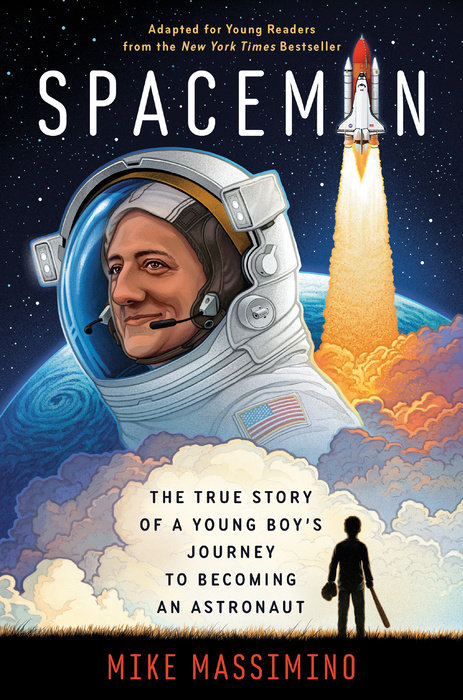Spaceman (Adapted for Young Readers)
Author Mike Massimino
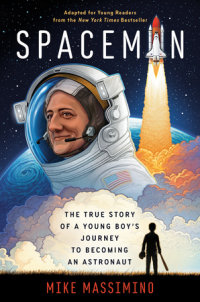
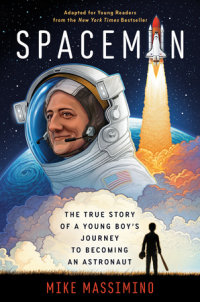
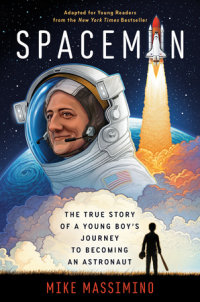
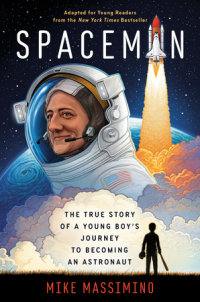
Spaceman (Adapted for Young Readers)
An astronaut who completed spacewalks on two Hubble missions tells his inspiring story in this middle grade adaptation of his bestselling adult memoir, Spaceman: An Astronaut's Unlikely Journey to Unlock the Secrets of the Universe. Fans of The Right Stuff and Apollo 13 will be thrilled by this astronaut's real life adventure.
From the time he was seven-years-old and saw Apollo 11 land on the moon, Mike Massimino dreamed of becoming an astronaut. Long Island is…
An astronaut who completed spacewalks on two Hubble missions tells his inspiring story in this middle grade adaptation of his bestselling adult memoir, Spaceman: An Astronaut's Unlikely Journey to Unlock the Secrets of the Universe. Fans of The Right Stuff and Apollo 13 will be thrilled by this astronaut's real life adventure.
From the time he was seven-years-old and saw Apollo 11 land on the moon, Mike Massimino dreamed of becoming an astronaut. Long Island is a long way from space. Kids like him, growing up in working-class families, seldom left the neighborhood. But with the encouragement of teachers and mentors, Mike ventured down on a path that took him to Columbia University and to MIT. It wasn't easy. There were academic setbacks and disappointments aplenty--and NASA turned him down three times. Still, Mike never gave up. He rose to each challenge and forged ahead, inching closer to realizing his boyhood dream. His love of science and space, along with his indomitable spirit and sense of teamwork eventually got him assigned to two missions to fix the Hubble Space Telescope--as a spacewalker.
Spaceman takes readers on Mike's unlikely ride from Earth to space, showing the breathtaking wonder of science and technology along the way.
"Mike Massimino is a spaceman through and through. In this edition for young people, he tells us how hard work can take you out of this world. He believes in teamwork, and he never gives up. Prepare to be inspired." --BILL NYE, SCIENCE GUY and CEO, THE PLANETARY SOCIETY
An Excerpt fromSpaceman (Adapted for Young Readers)
P R O L O G U E
A Science Fiction Monster
On March 1, 2002, I left Earth for the first time. I got on board the space shuttle Columbia and I blasted 350 miles into orbit. It was a big day, a day I’d been dreaming about since I was seven years old, a day I’d been training for nonstop since NASA had accepted me into the astronaut program six years earlier. But even with all that waiting and planning, I still wasn’t ready. Nothing you do on this planet can ever truly prepare you for what it means to leave it.
Our flight, STS-109, was a servicing mission for the Hubble Space Telescope. We were a crew of seven, five veterans and two rookies, me and my buddy Duane Carey, an Air Force guy. We called him Digger. Every astronaut gets an astronaut nickname. Because of my name and because I’m six feet three inches, everybody called me Mass.
Ours was going to be a night launch.
P R O L O G U E
A Science Fiction Monster
On March 1, 2002, I left Earth for the first time. I got on board the space shuttle Columbia and I blasted 350 miles into orbit. It was a big day, a day I’d been dreaming about since I was seven years old, a day I’d been training for nonstop since NASA had accepted me into the astronaut program six years earlier. But even with all that waiting and planning, I still wasn’t ready. Nothing you do on this planet can ever truly prepare you for what it means to leave it.
Our flight, STS-109, was a servicing mission for the Hubble Space Telescope. We were a crew of seven, five veterans and two rookies, me and my buddy Duane Carey, an Air Force guy. We called him Digger. Every astronaut gets an astronaut nickname. Because of my name and because I’m six feet three inches, everybody called me Mass.
Ours was going to be a night launch. At three in the morning, we walked out of crew quarters at Kennedy Space Center to where the astro van was waiting to take us out to the launchpad. This was only the second shuttle mission since the terrorist attacks of 9/11,and there were helicopters circling overhead and a team of SWAT guys standing guard with the biggest assault rifles I’d ever seen. Launches had always had tight security, but now it was even more so. Digger was standing right next to me. “Wow,” he said, “look at the security. Maybe it’s a 9/11 thing.”
I said, “I don’t know. I think they’re here to make sure we actually get on.”
I was starting to get nervous. What had I signed up for? I could swear that one of the SWAT guys was staring at me—not at potential terrorists, but right at me. It felt like his eyes were saying, Don’t even think about running for it, buddy. It’s too late now. You volunteered for this. Now get on my bus.
We got on and rode out to the launchpad, everything pitch-black all around us. The only light on the horizon was the shuttle itself, which got bigger and bigger as we approached, the orbiter and the two solid rocket boosters on each side of that massive rust-orange fuel tank, the whole thing lit up from below with floodlights.
The driver pulled up to the launchpad, let us out, then turned and high-tailed it out of the blast zone. The seven of us stood there, craning our necks, looking up at this gigantic spaceship towering seventeen stories high above the mobile launcher platform. I’d been out to the shuttle plenty of times for training, running drills. But the times I’d been near it, there was never any gas in the tank, the liquid oxygen and liquid hydrogen that make rocket fuel. They don’t put it in until the night before, because once you add rocket fuel it turns into a bomb.
The shuttle was making these ungodly sounds. I could hear the fuel pumps working, steam hissing, metal groaning and twisting under the extreme cold of the fuel, which is hundreds of degrees below zero. Rocket fuel burns off at very low temperatures, sending huge billows of smoke pouring out. Standing there, looking up, I could feel the power of this thing. It looked like a beast waiting there for us.
The full realization of what we were about to do was starting to dawn on me. The veterans, the guys who’d flown before, they were in front of me, high-fiving each other, getting excited. I stared at them like Are they insane? Don’t they see we’re about to strap ourselves to a bomb that’s going to blow us hundreds of miles into the sky?
I need to talk to Digger, I thought. Digger’s a rookie like me, but he flew F‑16 fighter jets in the Gulf War. He’s not afraid of anything. He’ll make me feel better. I turned to him, and he was staring up at this thing with his jaw hanging down, his eyes wide open. It was like he was in a trance. He looked the way I felt. I said, “Digger.”
No response. “Digger!” No response. “Digger!”
He shook himself out of it. Then he turned to me. He was white as a ghost.
People always ask me if I was ever scared going into space. At that moment, yes, I was scared. Up to that point I’d been too excited and too busy training to let myself get scared, but out there at the launchpad it hit me: Maybe this wasn’t such a good idea. This was really dumb. Why did I do this? But at that point there was no turning back.
When you’re getting ready to launch, you have this big rush of adrenaline, but at the same time the whole process is drawn out and tedious. From the bottom of the launch tower, you take an elevator up to the launch platform at ninety feet. You make one last pit stop at a bathroom up there—the Last Toilet on Earth, they call it—and then you wait. One at a time, the ground crew takes each astronaut across the orbiter access arm, the gangway between the tower and the shuttle itself. You can be out on the platform for a while, waiting for your turn. Finally they come and get you, taking you across the arm into a small white room where they help you put on your parachute harness. Then you wave good-bye to your family on the closed-circuit camera and go in through the shuttle hatch. You enter on the mid-deck, where the crew’s living quarters are. Up a small ladder is the flight deck. Neither is very big; it’s pretty cozy inside the shuttle. Four astronauts, including the pilot and commander, sit on the flight deck for launch. They get windows. The remaining three sit on the mid-deck.
Once you’re inside, the ground crew straps you in. They help you affix your helmet to your orange launch and entry suit. You check your oxygen, check your gear. Then you lie there. If you’re on the mid-deck like I was there aren’t any windows, so there’s nothing to look at but a wall of lockers. You’re there for a few hours waiting for everything to check out. You chat with your crewmates and you wait. Maybe play a game of tic-tac-toe on your kneeboard. You’re thinking that you’re going to launch, but you can’t be sure. NASA’s Launch Control Center will cancel a flight right up to the last minute because of bad weather or anything questionable with the spaceship, so you never really know until liftoff. Once it’s down to about an hour, you glance around at your buddies like, Okay, looks like this might actually happen. Then it gets down to thirty minutes. Then ten minutes. Then one minute. Then it gets serious. With a few seconds left, the auxiliary power units start. The beast that terrified you out on the launchpad? Now that beast is waking up. At six seconds you feel the rumble of the main engines lighting. The whole stack lurches forward for a moment. Then at zero it tilts back upright again and that’s when the solid rocket boosters light and that’s when you go. There’s no question that you’re moving. It’s not like Oh, did we leave yet? No. It’s bang! and you’re gone. You’re going 100 miles an hour before you clear the tower. You accelerate from 0 to 17,500 miles an hour in eight and a half minutes.
It was unreal. I felt like some giant science fiction monster had reached down and grabbed me by the chest and was hurling me up and up and there was nothing I could do about it. Right after we launched, I realized that all the training we’d had on what to do if something went wrong during launch—how to bail out, how to operate the parachutes, how to make an emergency landing—I realized that all those years of training were completely pointless. It was just filler to make us feel okay about climbing into this thing. Because if it’s going down, it’s going down. It’s either going to be a good day or it’s going to be a bad day, and there is no in-between. There are emergency placards and safety signs all over the interior of the shuttle, telling you what to do and where to go. That stuff is there to give you something to read before you die.
After about a minute, once the initial shock passed, this feeling came over me. I had a sensation of leaving. Like, really leaving. Not just good-bye but adios. I’d been away from home before, on vacations and road trips, flying out to California, going camping in East Texas. But this time, my home, this safe haven I’d known my whole life, I was leaving it behind in a way that I never had before. That’s what it felt like: truly leaving home for the first time.
It takes eight and a half minutes to make it into orbit. Eight and a half minutes is a long time to sit and wonder if today is going to be the day you get it. You can’t say much because your mic is live and you don’t want to get on the command say anything stupid that might distract people. It’s not the time to try to be clever. You just keep lying there, looking at your buddies, listening to the deafening roar of the engines, feeling the shuttle shake and shudder as it fights to break out of the Earth’s atmosphere. You get up to three g’s for about two and a half minutes at the end and you feel like you weigh three times your body weight. It’s like you have a pile of bricks on your chest. The whole thing can be summed up as controlled violence, the greatest display of power and speed ever created by humans.
As you’re leaving the Earth’s atmosphere, the bolts holding you to the fuel tank blow. You hear these two muffled explosions through the walls of the shuttle—fump! fump! —and then the fuel tank is gone and the engines cut and the whole thing is over as abruptly as it began. The roar stops, the shuddering stops, and it’s dead quiet. All you hear are the cooling fans from some of the equipment gently whirring in the background. Everything around you is eerily, perfectly still.
You’re in space.
Once the engines cut and you’re in orbit, the shuttle’s no longer accelerating. Your perception is that you’ve come to a complete stop. You’re moving at 17,500 miles per hour, but your inner ear is telling your brain that you’re perfectly still; your vestibular system works on gravity, and without any gravity signals coming in, the system thinks you’re not moving. So you have this sensation like you’re lurching forward but then you come to a stop when the engines cut. You feel like you’re sitting straight up in a dining room chair, except that you’re still strapped down flat on your back. It’s completely disorienting.
The first thing I did was ask myself, Am I still alive? It took me a moment to answer. Yes, I’m still alive. We’d made it, safely. It took me a minute or two to get my bearings. Then, once I felt acclimated, it was time to go to work. I reached up and took my helmet off and—just like I’d watched Tom Hanks do in Apollo 13—I held it out and let it go and floated it in the air in front of me, weightless.
